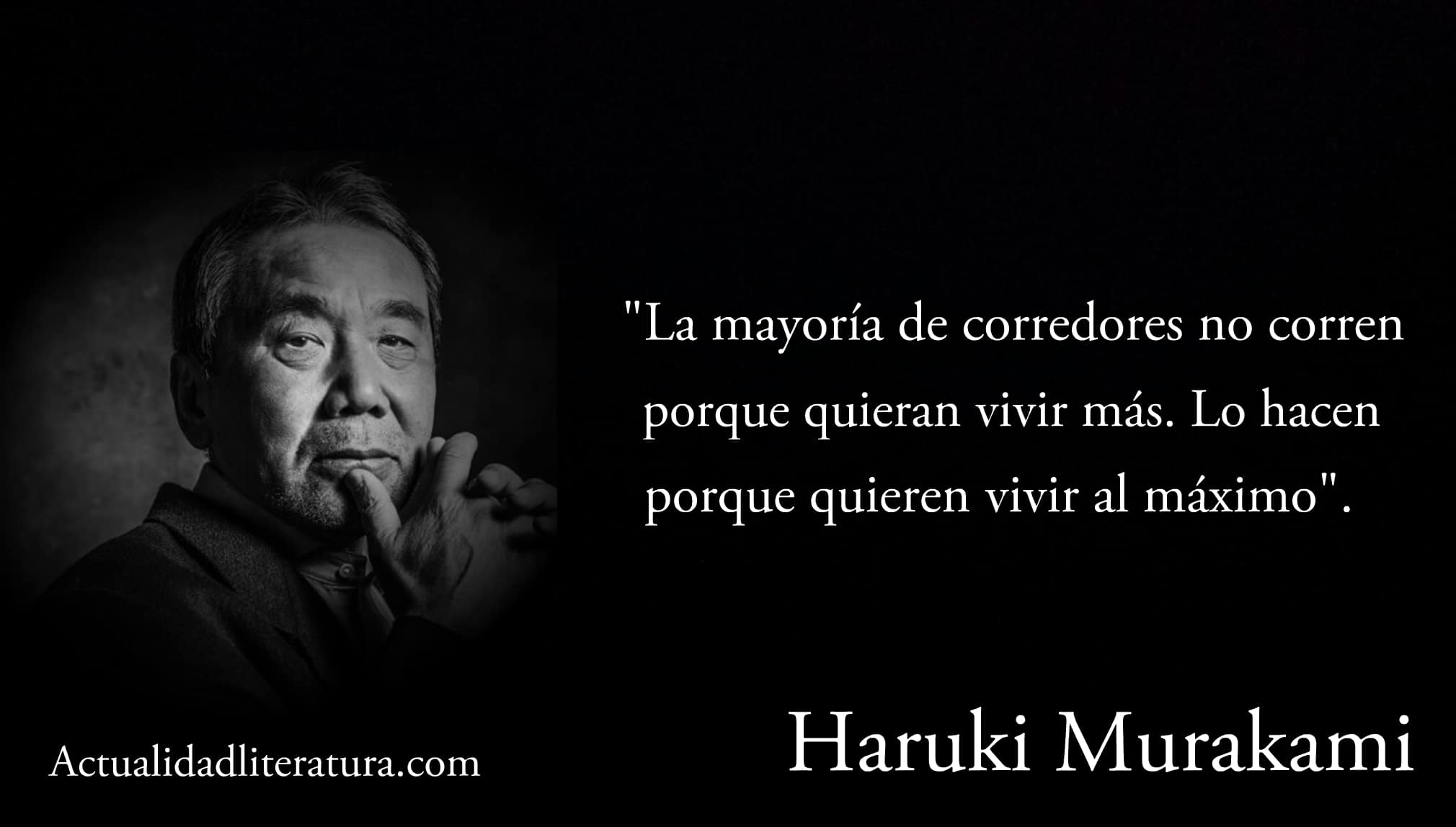
Haruki Murakami quote.
Haruki Murakami is the best known Japanese writer in the world today. We are talking about a best-selling author in the full extent of the term. Listed as surrealist, although he has ventured more than once with realism. The combination of Western features with characteristics of the Japanese idiosyncrasy is part of his own style.
Loneliness, melancholy and love are some of his recurring themes. Their universes go from the most oppressive atmospheres - dystopias, in literary terms - to the most hopeful oneirism. Thus, has been recognized with multiple awards throughout its trajectory. What's more, his most passionate readers year after year complain that he has not yet been recognized with the Nobel Prize for Literature.
From Kyoto to the world
Born on January 12, 1949 in Kyoto, he lived much of his youth in Kobe. Precisely, these cities, along with Tokyo, are some of the recurring scenarios explored by Murakami through his characters. Because many of his stories revolve precisely around that verb: explore.
The love for letters he inherited directly from his parents; both were dedicated to the teaching of Japanese literature. In addition, from an early age he was greatly influenced by western culture. To date, his work includes 14 novels, 5 collections of stories, 5 illustrated stories, and 5 essays.
Nostalgia in the work of Haruki Murakami
Murakami immerses his readers in the deepest introspection. His texts are made up of a fine mix between reality and fantasy., seasoned with an immense sadness present in practically all of his stories. Therefore, his narratives are extremely melancholic, with a great emotional charge in each sentence.
A sample: Kafka on the Shore

Kafka on the shore.
You can buy the book here: Kafka on the shore
With Murakami's books, readers experience the experiences of his characters as if they were in their own flesh. In them, it is sometimes difficult to see a light of hope among so many cloudy thoughts. Kafka on the shore (2002) —for many the best work of the author— compiles all the narrative characteristics mentioned above.
Those who have a book in their hands are not only witnesses of what it means to be abandoned. No. But they also feel lost in a world of encounters and misunderstandings with characters that interweave, without knowing it, the tragedy of the protagonist. The double plot masterfully interspersed in ingenious way by Murakami does not give truce in any line.
The life of Kafka Tamura awaits the reader nostalgically in each odd chapter, while the story of Satoru Nakata awaits them in pairs. All meticulously basted until their paths, unstoppably, coincide.
Before and after Tokyo Blues
You can buy the book here: Tokyo Blues
Tokyo Blues (1986) is not his first novel, however, its publication opened the doors to internationalization. Represents a consecrating title, which allowed him to become known in Japan and in much of the world. It sold so well that the royalties were enough to live with his wife Yoko, first in Europe and then in the United States.
Paradoxically the author himself once confessed that when he wrote it, his challenge was to be completely realistic. His previous works - republished thanks to the success of this book, also known as Norwegian Wood- as well as most of his subsequent releases, they are more faithful to the “classic Murakami style”. This peculiar narrative form could be defined as “dream fantasies”.
A depressive author?
He is a realistic author, but he does not renounce other fanciful features. On Tokyo Blues, Murakami is immersed in the deepest nostalgia. Equally, yes, the writer explores related feelings like depression and guilt. The use of the English word blues in the title, it's not because of the blue color. In fact, it is due to the "sadness" of the musical genre, that is the direction where the writer is pointing precisely.

Tokyo Blues.
Many fans and an equivalent number of haters
His books keep critics and the general public divided into two groups that are virtually identical in size. Well Haruki Murakami is one of those artists who love or hate each other. However, all literary critics seem to harbor an undeniable need to express an opinion on him. Favorable or not ... it does not matter, regardless of whether you have read little or nothing of its extensive catalog.
The "problem" (highlighting the quotation marks) is caused by the particular expressions present in some of his stories. In them, the border between the sublime and the cheesy is not marked by a “thin red line”. It's actually a huge pink patch polluting all that it reaches.
Nobody is a prophet in their own land?
Perhaps where his figure generates the most discussions is in Japan. Some disqualifying voices accuse him of limiting himself to decorating a fictitious image of his country, without contradicting the preconceptions existing in the West. Of course, understanding by the West only the "affluent" Europe (England, Germany, France) together with the United States.
Moreover, it is questioned a lot (almost as a bad joke) that he is considered the greatest exponent of Japanese literature of the last decades. These adverse opinions are marked by the high amount of "western" references present in his work.
The most "American" of the Japanese
Murakami has never hidden his admiration for Anglo-Saxon music, especially for The Beatles (hence the alternate title for Tokyo Blues). However, his disparaging appreciation (repeatedly demonstrated) of groups like Duran Duran is controversial. Similarly, the influence of Hollywood cinema is evident in their stories.
The king of marketing
Finally, and leaving out any aesthetic considerations, Murakami is one of the authors who has best known how to take advantage of the advantages of modern marketing. Each launch or relaunch of any text with your signature is a trend on the internet for weeks or months. The economic results are truly impressive.
Enough to be convicted? Can't a good writer be a best seller? These types of debates are very frequent these days. In this particular case —and in some others, like Paulo Coelho's, for example—, por moments a lack of dissimulation is perceived when squeezing the “goose that lays the golden eggs”.
Why change?
It is a maxim of sports and business: winning formulas are not changed. At least not as long as they remain efficient and profitable. At the end of the day, haters they are always relevant in this equation. Oscar Wilde already said: The only thing worse than being talked about is not being talked about. It translates: the only thing worse than being talked down to is not being talked about.